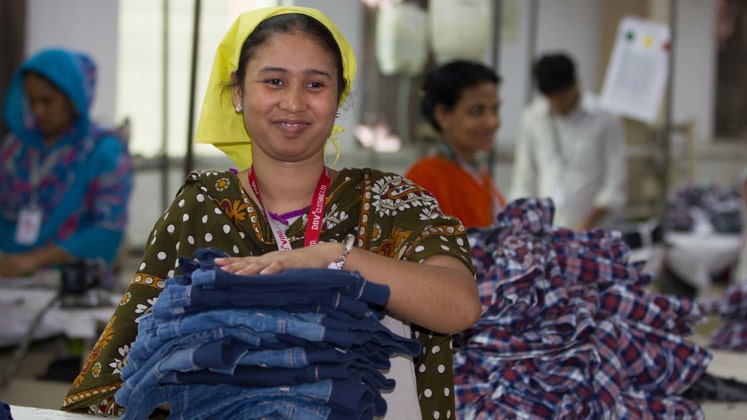
To deal with the fallouts of this second wave of the pandemic, garment makers have called upon the Government to come up with a fresh stimulus package to pay wages of workers for a few more months as second wave of COVID-19 has started taking its toll on the readymade garment (RMG) sector, they claimed.
“We had thought that we would be able to make a total turnaround ahead of Christmas, but it won’t be possible now. The second wave (of Coronavirus infections) has thrown all our calculations out of the window. Several countries have gone back into lockdown,” maintained Anwar-Ul-Alam Chowdhury Parvez, a former President of Bangladesh Garment Manufacturers and Exporters Association (BGMEA).
Even as the West continues to battle against the second wave of the Coronavirus pandemic, the repercussion, though thousands of miles away, is being felt equally strongly in Bangladesh now amidst country’s garment makers upping the ante seeking another rescue package for the industry.
Bangladesh’s export earnings in November posted a negligible 0.76 per cent year-on-year growth, but the country missed the target by 8.2 per cent. As per Bangladesh’s Export Promotion Bureau (EPB), exports in November fetched around US $ 3.1 billion, slightly up from a year earlier, but missed the target while readymade garments, which fetch more than 84 per cent of total export receipts, posted a decline.
In November the growth of knitwear export was 4.9 per cent while export of woven garments fell by 10.48 per cent as overall export of readymade garments fell for the second consecutive month in November year-on-year.
As per EPB figures, earnings from apparel exports in the five months of FY ’21, fell by 1.48 per cent to US $ 12.89 billion from US $ 13.08 billion in the same period of FY ’20 even as the country’s garment exporters underlined that consequent to reinstatement of cancelled orders by global buyers, exports witnessed a meagre growth in August and September before marking a decline again in October due to the second wave of the COVID-19 pandemic.
“We have collected data from 50 garment factories that showed buyers are placing 30 per cent less orders than the previous year as the second wave of the pandemic has prolonged the uncertainty over increasing retail sales and demand in the Western countries,” maintained BGMEA President Dr. Rubana Huq.
So, as the crisis wrought by the second wave of the pandemic gains in severity, the clamour for another rescue package (fresh stimulus) to offset the COVID-19 fallouts grows stronger.
The apparel exporters on 7 December (Monday) called upon the Government to come up with a fresh stimulus package to pay wages of workers for a few more months, claiming that the second wave of COVID-19 outbreak has started taking its toll on the readymade garment (RMG) sector.
“Although the readymade garment export in September registered a positive growth, the shipment decreased significantly in October and November as buyers are placing 30 per cent less orders because of the second wave of the pandemic. Considering the situation, the sector needs a new package to save the business and livelihood of workers,” said Rubana.
The garment sector is the driver of the economy as it employs millions said the BGMEA President further while adding to save the industry from collapse and to protect the workers, the garment makers are requesting the Government to provide policy support including a new package.
If diminishing order quantities was not all, complicating things further has been the rising cost of raw materials and fall in prices of apparel products.
On an average, the prices of raw materials such as fabrics, yarns, cotton and packaging materials, edged up 5 to 10 per cent in the last couple of months, according to industry people, who added rise in cotton prices, the low productivity caused by the pandemic and a stronger Chinese Yuan are largely to blame for the price ticking up.
Every week, the prices of materials are rising. As a result, the manufacturers are suffering a lot, said SM Khaled, Managing Director of Snowtex.
“The prices of apparel raw materials went up at a time when the exporters are facing several challenges such as price cuts by the global buyers, fewer work orders than capacity and work orders cancellations,” said Fazlee Shamim Ehsan, owner of Fatullah Apparels, adding “In this context, the prices of raw materials going up has left us with too many survival challenges.”
As per the BGMEA President, amid the pandemic, the prices of apparel goods fell by 5.23 per cent in September in the global market and 4.15 per cent in the US.
She said that the prices of readymade garment products had been decreasing for the last five years in the global market and the unit prices of Bangladeshi RMG decreased by 5.23 per cent in September while the fall in October was 4.15 per cent and in November 4.92 per cent.
Both the prices and the exports of RMG products are decreasing in the western markets as a good number of countries went for fresh lockdowns or partial lockdowns due to the second wave of the COVID-19 pandemic, Rubana said.
Acknowledging the Government’s immediate and farsighted policy support, the apparel makers were able to face the first wave of the pandemic effectively, she said while the second wave posed grave threats.
“Without policy support from the Government, entrepreneurs alone could not face the crisis,” cautioned Rubana before requesting for a deadline extension of two to five years, with a one-year grace period, for repaying the initial Taka 5,000 crore stimulus package.
It may be mentioned here that Bangladesh Government provided a stimulus package worth Taka 5,000 crore with two per cent interest to pay the RMG workers’ wages for the months of April and May. Later the Government disbursed another Taka 5,000 crore for paying wages of the workers for two more months.
The moratorium period on the loans will end in January 2021.
Rubana urged the Government further to increase moratorium on the loan to one year from six months.
Meanwhile, economists and experts have also called upon the Government to expand stimulus packages while underlining that many businesses were not getting loans due to what they claim poor management on the part of the Government and non-cooperation from the banks.
The Finance Ministry has claimed to have completed 55 per cent of disbursements from over Taka 1.2 lakh crore worth of stimulus packages offered to help businesses bounce back from pandemic shocks but experts maintain such bailout packages have hardly had any positive impact to offset the damages suffered by small ventures and marginalised people.
Moreover, a large number of entrepreneurs from manufacturing and service sectors have not received any benefit from the stimulus packages yet, said industry insiders while economists attribute many businesses not getting loans to poor management on the part of the Government coupled with non-cooperation from the banks.
However, Finance Division Senior Secretary Abdur Rouf Talukder said Bangladesh’s economy has made a turnaround from the COVID-19 fallout and businesses are now going on smoothly while implementation of stimulus loans has so far reached 55 per cent but conceded slow progress in disbursements for small and medium enterprises (SMEs) and the agriculture sector.
As of October, only Taka 6,500 crore from the Taka 20,000 crore package allocated for the SME sector has been disbursed, according to data from the Bangladesh Bank while on the other hand, importers have borrowed Taka 8,000 crore from the Taka 33,000 crore package for large industries at 2 per cent interest rate. Besides, only Taka 276 crore in agriculture loan from the Taka 3,000 crore re-financing scheme and Taka 497 crore from the Prime Minister-announced special scheme for agriculture amounting to Taka 5,000 crore were reportedly distributed.
“I have talked to at least 150 women entrepreneurs and they told me that they did not get any benefit from stimulus loans,” claimed Senior Fellow at the Bangladesh Institute of Development Studies (BIDS), Dr Naznin Ahmed while Executive Director at South Asian Network on Economic Modelling (SANEM), Dr Selim Raihan said most businesses except for the big ones were yet to get stimulus loans.
Citing a survey report of SANEM, Selim said in September, 72 per cent of businesses did not receive any money from the Government-announced stimulus packages, while 9 per cent of company proprietors did not know enough about the packages.
Of the 301 small firms covered in the survey, 8 per cent received incentives while of the 44 medium-sized firms, 20 per cent reportedly received the funds. Meanwhile, some 156 large firms took part in the survey, of which 41 per cent had received the stimulus funds.
Dr Selim Raihan said because of a complicated process, non-compliance with all bank conditions, and a lack of information about incentives, small companies were not getting the funds.
“During the pandemic, the apparel sector has managed to survive on the back of the stimulus package,” said Commerce Minister Tipu Munshi while adding, “If we continue our business activities, our people can get money, and the wheel of our overall economy will remain in motion.”
He also claimed that ministries and organisations have strengthened their coordinated efforts to mitigate the impact of COVID-19.
Now if the Government would come up with a new package to infuse fresh lease of life to the RMG sector, which is the lifeline of the country’s economy and is faced with various challenges currently on account of the pandemic, or would heed to the garment makers’ request to extend the repayment period of loans taken from the earlier package, remains to be seen.






